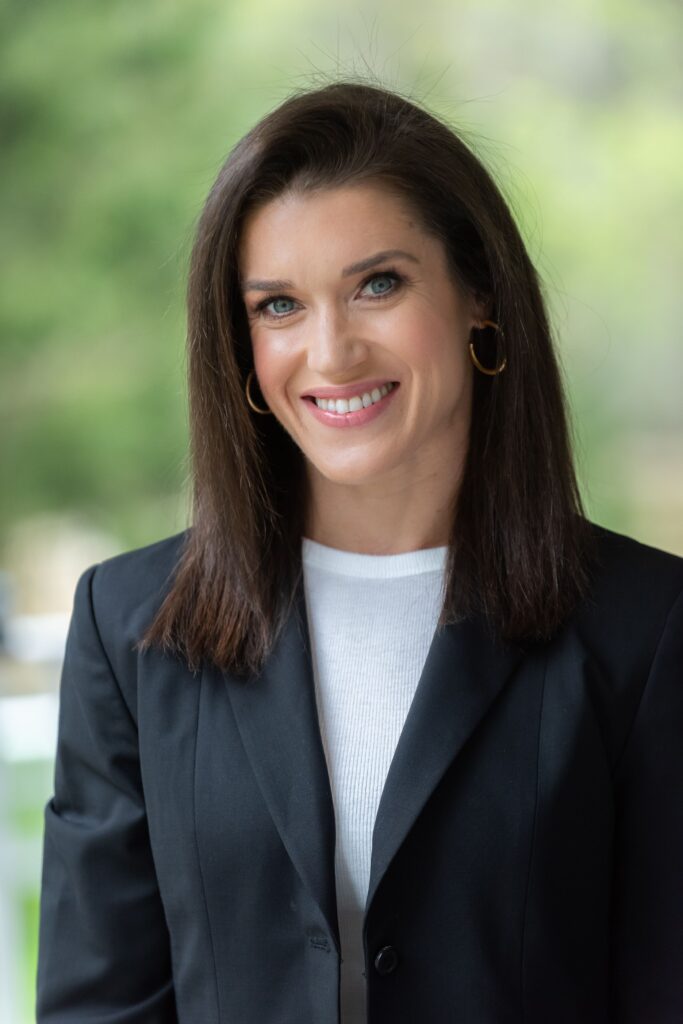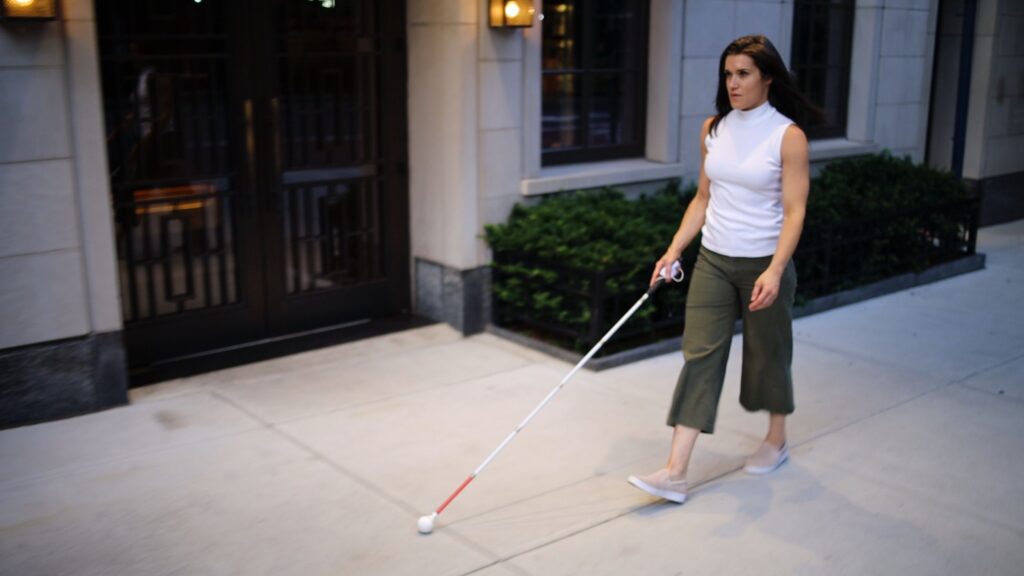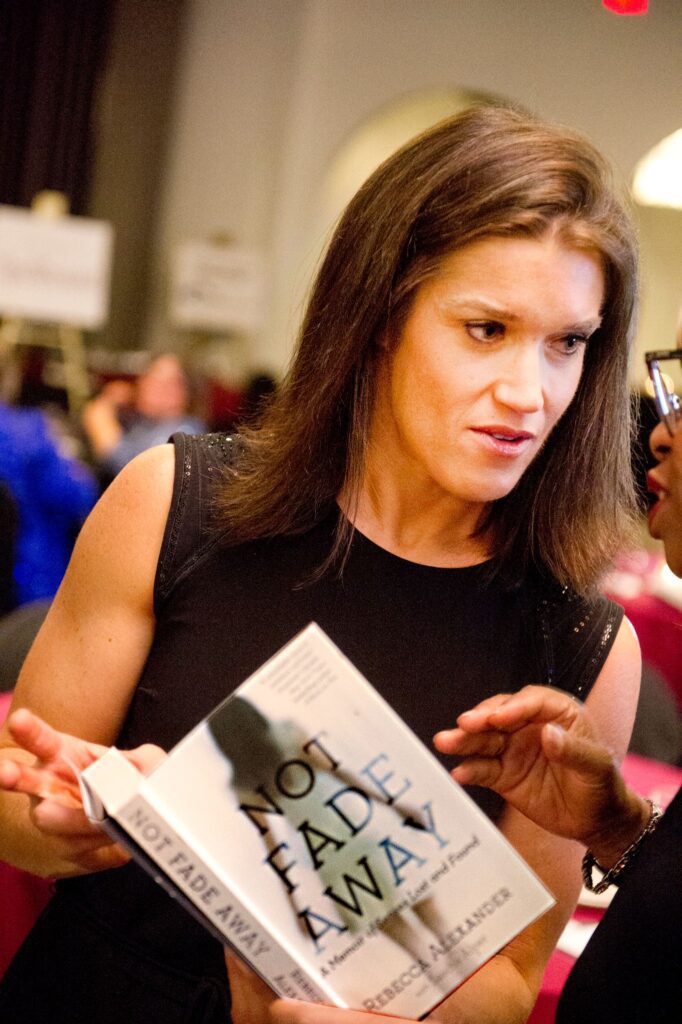“There is no purer form of humanity than offering help, accepting help, helping yourself and receiving him.”
Upon hearing Rebecca Alexander’s story, the first thing that comes to my mind are words from a short Mary Oliver poem:“The Uses of Sorrow.” Succinctly, Oliver writes: Someone I loved once gave me a box full of darkness.It took me years to understand that this, too, was a gift.” Ever inspirational and intrinsically healing, Oakland-born Alexander is a psychotherapist, extreme athlete, group fitness instructor ,public speaker and disability rights advocate. Now almost completely blind and deaf, she began losing her sight and hearing in adolescence due to Usher syndrome, type III, a rare genetic disorder. Alexander won’t pretend it has been easy but she’s “learned to live with it,” adapting, grieving, rebooting and ever working to let go of what can’t be controlled in favor of focusing on what can. For her, mindfulness is everything.

“We talk about overcoming challenges, but I haven’t overcome anything. I have lived with it. That’s a shift in our way of looking at life that I think is important. Darkness is a huge part of life.”
It’s the message she brought to the Bay Area on August 19th, when she headlined at An Enchanting Evening, a gala event for LightHouse for the Blind and Visually Impaired San Francisco. Proceeds for the event go toward rebuilding and upgrading facilities at LightHouse’s Enchanted Hills Camp, located in the heart of Napa Valley. “Summer camps are a place where anyone, regardless of ability, can experience the power of community in nature. But I’m especially delighted to support LightHouse’s efforts to create a world-class facility to serve campers who might otherwise not have access to the confidence-building activities and opportunities Enchanted Hills offers,” says Alexander. Fascinated and inspirited by her story, we spoke with Alexander to draw fortitude from her wisdom.
HL: On your website you write: “There is no purer form of humanity than offering help, accepting help, helping yourself and receiving him.” It seems this has been your life mantra. Upon hearing your story, Mary Oliver’s short poem the “The Uses of Sorrow”came to mind. (“Someone I loved once gave me a box full of darkness. It took me years to understand that this, too, was a gift.”) You have taken what some might consider a trial and turned it to a huge gift to the world. How has helping others helped you overcome your challenges?
RA: I haven’t heard that poem and I really like it. We talk about overcoming challenges, but I haven’t overcome anything. I have lived with it. That’s a shift in our way of looking at life that I think is important. Darkness is a huge part of life. Life’s not always what we see on social media, but we all have darkness. Part of how I lean into that is allowing myself to feel the whole range of emotions of being human. I cry, I mourn. I feel darkness and heaviness. Asking for help is very important. It’s one of the hardest things because people fear being a burden. But when you ask for help instead of being a burden you are engendering others to connect. You let people know they are needed and that they matter. There’s nothing people want more than to know that they matter. It’s the subject of my TED TALK: HELP (Humanity’s Essence Living Proof). Helping others gives me a sense of being connected and being able to pay it forward for all the help I have received.
HL: According to many reports, we are living in a time of widespread anxiety, depression, gloominess and despair. As we know, everyone is working on something though it isn’t always obvious. What are some suggestions you have for working our way out these funks? For bringing light?

RA: With social media we have so much access to information—and not all of it factual. We have a lot of sensory overload. People do things mindlessly rather than with intention. Have you ever walked into a room to do something, arrive, then wonder why you are there? Or been looking for your phone while you were on it? We get caught in the chatter. If people are going to spend time on social media, do it with intention. Make it a time cap of 20 minutes (or whatever time period you choose, but stick with it). Make sure the accounts you read and follow are ones that make you feel whole. For example, I follow a lot of dogs—and comedians. The other piece of this is that we long to be connected with one another. We must spend time with others and not just on the screen.
HL: It’s clear that exercise and athletic goals have helped you. Tell us about that and some of the extreme accomplishments you’ve mastered in this area. What is your daily routine and tell us what classes you teach—and why?
RA: I was in a very serious accident when I was young, which left me with many broken bones. It was exercise and rehabilitation that helped restore me. As my vision and hearing continued to decline and I realized that I had no control over that, I began to focus on what I could control. One of those things is to strengthen my body. I am a big fan of HIT classes, for example. In all things but also in terms of of extreme athletic accomplishments, I focus on what I can do, not what I can’t. It wasn’t easy to climb Mt. Kilimanjaro, swim from Alcatraz to the shore or do a 600 mile bike ride—but each of these things, though rife with challenges, made me feel alive.

HL:Your story is nothing short of inspiring. Gratitude plays a role. How do you weave gratitude into every day?
RA: What does gratitude really mean? Perhaps the “I am so grateful” comments and emojis we have on social media have made the concept so mainstream that gratitude has lost some of its true meaning. For me, gratitude is something that co-exists with all aspects of your life. So you can be having a really bad day and still be grateful. It doesn’t mean things are perfect. It means being able to incorporate gratitude with being human. For example, when I walk to work each day in New York, though I can’t see well, I’ve learned to be grateful for what I know about the sidewalk, all its dips and danger, where to step aside and where to continue.
